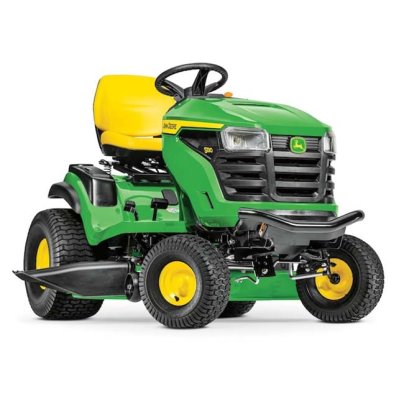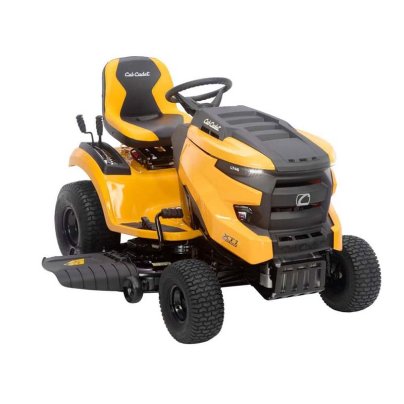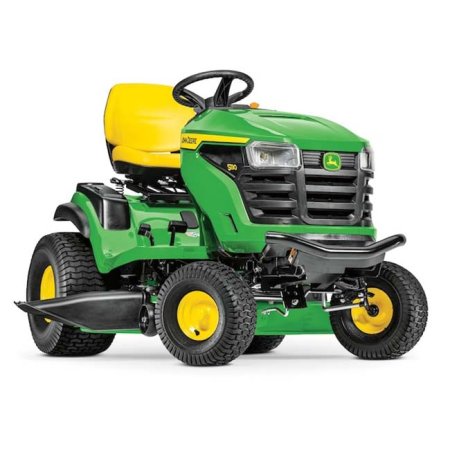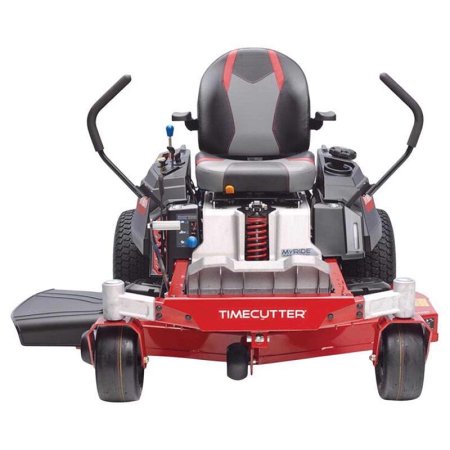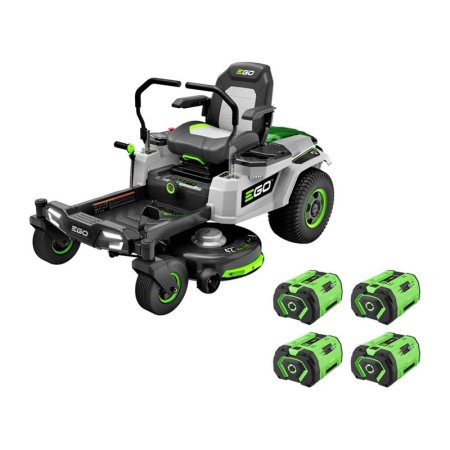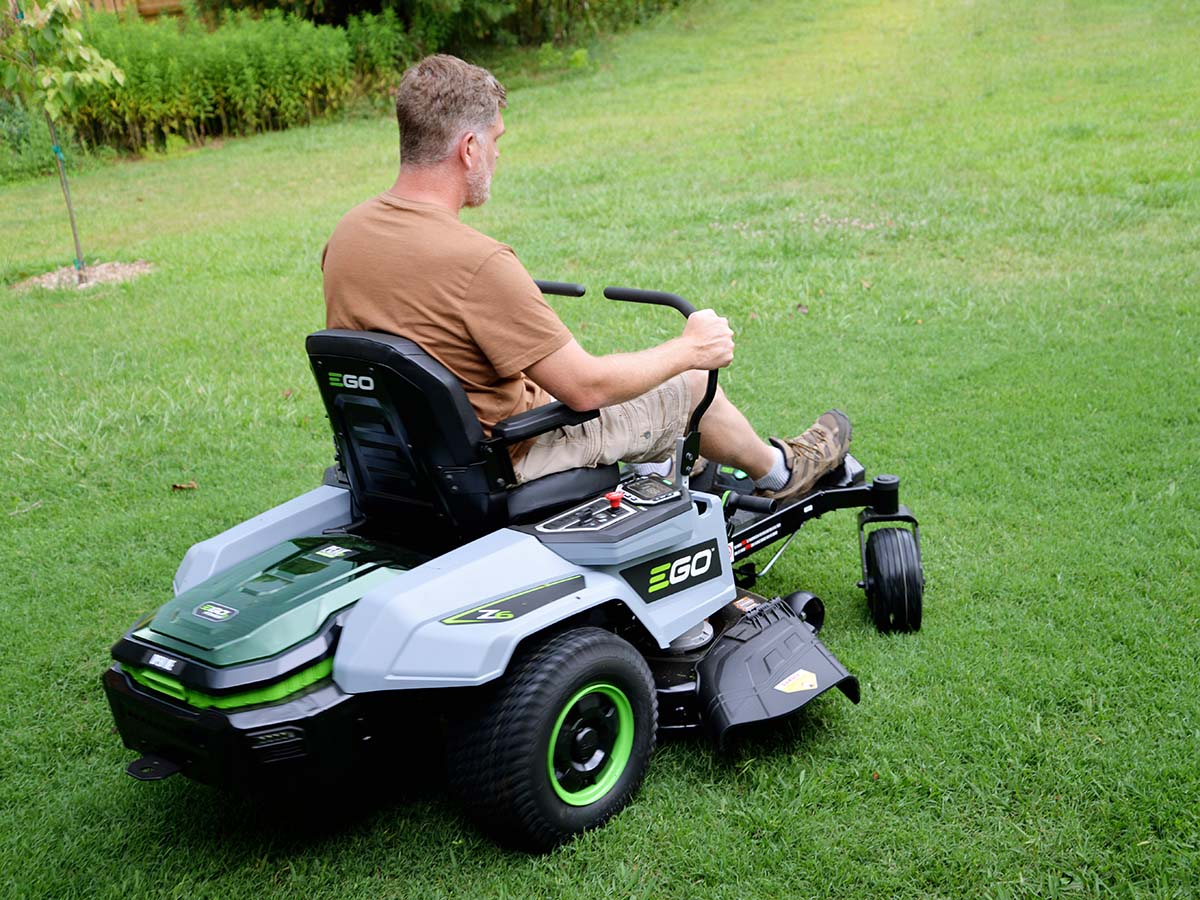
We may earn revenue from the products available on this page and participate in affiliate programs. Learn More ›
For yards larger than a half acre, riding lawn mowers deliver efficiency and ease far beyond what standard walk-behind mowers can offer. With powerful engines and the convenience of sitting rather than pushing, they dramatically reduce the time and effort required for lawn care. But with so many models available at such a wide range of prices, finding the right one for your yard can be challenging.
To put together a list of riding mowers worthy of recommending, we researched dozens of top options and tested several in our very own backyards. Based on our efforts, we selected the S130 from John Deere as the best choice for most, thanks to its smooth ride, tight turning radius, and straightforward maintenance schedule. Read on for in-depth reviews of the best riding lawn mowers, plus tips on what to look for when choosing the ideal option for your property.
- BEST OVERALL: John Deere S130 42″ S130 Lawn Tractor
↓ Jump to Review - BEST BANG FOR THE BUCK: Cub Cadet XT1 LT50 Enduro Series Lawn Tractor
↓ Jump to Review - BEST GAS ZERO-TURN: Toro 50″ TimeCutter MyRIDE Zero-Turn Mower
↓ Jump to Review - BEST BATTERY ZERO-TURN: Ego Power+ ZT4204L 42″ Z6 Zero-Turn Riding Mower
↓ Jump to Review
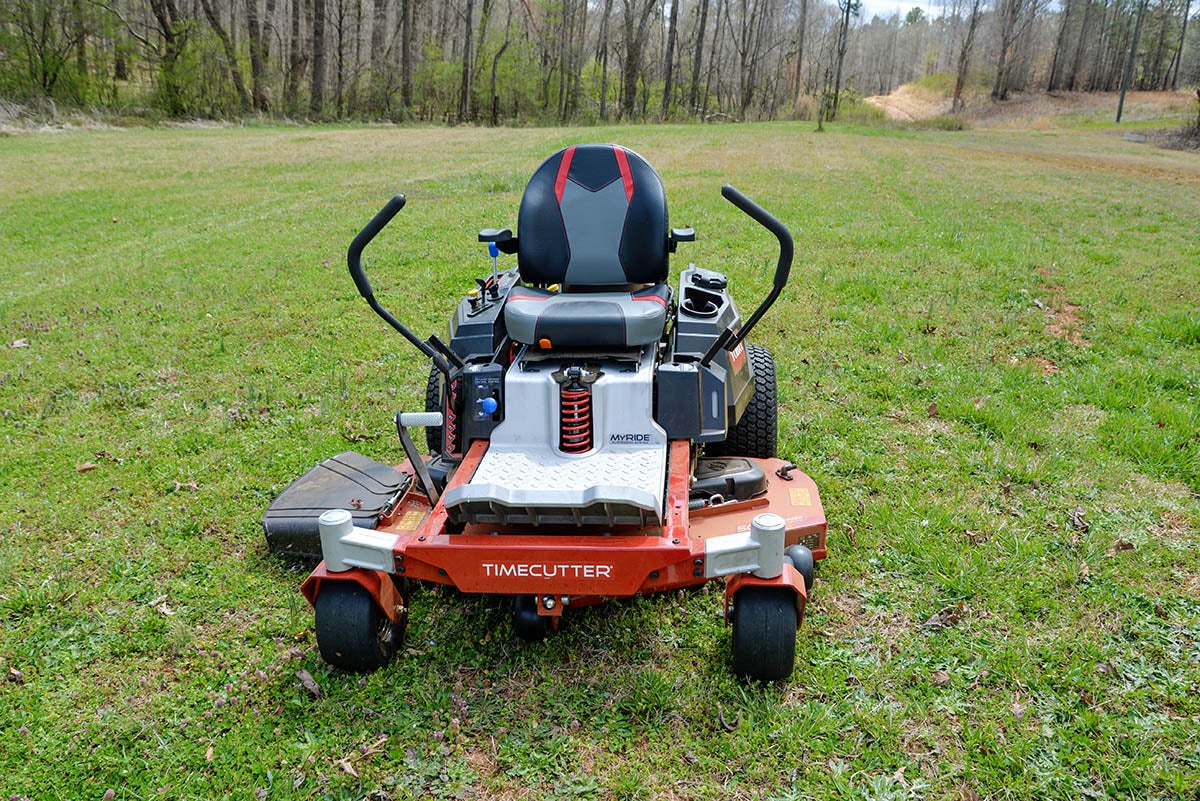
Riding Lawn Mowers Comparison Chart
| Product Name | Type | Power Source | Deck Size |
| John Deere S130 42″ S130 Lawn Tractor | Lawn tractor | 22 hp V-twin gas engine | 42 inches |
| Cub Cadet XT1 LT50 Enduro Series Lawn Tractor | Lawn tractor | 24 hp Kohler V-twin 7000 gas engine | 50 inches |
| Toro 50-Inch TimeCutter MyRIDE Zero-Turn Mower | Zero-turn mower | 24.5 hp Toro Commercial V-twin engine or 23 hp Kawasaki V-twin engine | 50 inches |
| Ego Power+ ZT4204L 42″ Z6 Zero-Turn Riding Mower | Zero-turn mower | Up to six 56V 10Ah ARC lithium batteries (4 included) | 42 inches |
Our Top Picks
We selected each of the following driving lawn mowers for our list of top picks based on their excellent performance in our hands-on tests. Each features a powerful engine, a wide deck, and quality construction, helping you make quick work of at least one of your weekend chores.
John Deere S130 42" S130 Lawn Tractor
What We Like
- Ideal for properties up to 2 acres
- Tight turning radius leaves uncut diameter of just 25 inches
- High vantage point and smooth, comfortable ride
- Easy 30-second oil-change system
What We Don’t Like
- More expensive than similar models
- Limited capability on hilly terrain
Product Specs
- Type: Lawn tractor
- Powered by: 22-horsepower (hp) V-twin gas engine
- Deck size: 42 inches
The John Deere S130 is our top pick because it combines dependability with operational comfort and convenience. This grass-cutting tractor has a 22 hp Briggs & Stratton 44 V-twin engine, a TLT 200 hydrostatic transaxle, and 20×10-8 rear tires. It also features a single-lever throttle with spring-return choke, electric blade engagement, a dash-mounted fuel gauge, and the John Deere Easy Change 30-second oil-change system.
Despite its long list of features, this mower doesn’t look much different than most lawn tractors. But looks can be deceiving: It also has a frame fabricated of full-length welded steel, a cast-iron front axle, and an engine with a full-pressure lubrication system for extended working life. It’s compatible with numerous attachments, including branded and universal baggers, snow blowers, and dump carts, all of which transform it into more than simply a high-performing riding mower with bagger.
As if everything we’ve listed thus far wasn’t enough, we also liked the easy-to-use control layout—including push-button blade engagement and a dash-mounted gas gauge—hydrostatic operation controlled by side-by-side pedals, and excellent maneuverability and mowing performance. We got up to about 5.5 miles per hour (mph) during our tests (fast enough to mow about 2 acres per hour), and we liked that the deck shape allowed for extremely close edge cutting. Raising the deck to any of the preset heights is easy via a spring-assisted lever, and the large tires provide plenty of cushion across uneven terrain.
Read our full review: John Deere S130 42″ Lawn Tractor
What our tester says: “One of our favorite things about this mower is how comfortable it is. The two-piece seat lets cool air circulate between the seat and backrest, and the fact that we sit higher up off than ground than on other mowers gives us a great vantage point.”—Mark Wolfe, Product Reviews tester and writer
Get the John Deere riding lawn mower at Lowe’s or John Deere.
Best Bang for the Buck
Cub Cadet XT1 LT50 Enduro Series Lawn Tractor
What We Like
- Wide deck and big engine for a relatively small riding lawn mower
- Outstanding comfort
- Best-in-class maneuverability
- Push-button cruise control, LED headlights, battery indicator, and translucent fuel tank
What We Don’t Like
- Large overall size requires ample storage space
Product Specs
- Type: Lawn tractor
- Powered by: 24 hp Kohler V-twin 7000 gas engine
- Deck size: 50 inches
There’s a lot about the Cub Cadet XT1 LT50 that makes it such an excellent all-around rider lawn mower. It runs off a 24 hp twin-cylinder Kohler engine, which provides plenty of power for its 50-inch cutting deck, even on inclines. Its hydrostatic transmission enables smooth speed changes, while its short wheelbase creates an impressive 16-inch turning radius. The cutting deck has three cutting blades and 12 easily adjustable cutting heights, and the fact that it has a 3-gallon fuel tank means you won’t need a refill, even for large jobs.
Other features that set the Cub Cadet XT1 LT50 apart include cruise control, which maintains a constant speed for the perfect cut, and a SmartJet deck pressure-washing system that lets you attach a garden hose to power-wash the interior. If you have a lawn that’s 1.5 acres or less and want a comfortable lawn-cutting machine to help you get the job done quickly and effortlessly, this Cub Cadet will be hard to beat.
Get the Cub Cadet riding lawn mower at The Home Depot, Tractor Supply Co., or Blain’s Farm & Fleet.
Best Gas Zero-Turn
Toro 50" TimeCutter MyRIDE Zero-Turn Mower
What We Like
- Commercial design enables thousands of hours of hard use
- Mows at up to 7 miles per hour
- Incredibly smooth ride over bumpy ground
- Enough fuel capacity to mow up to 4 acres per fill-up
What We Don’t Like
- Too wide to drive through most walk-through gates
- Not designed for hilly terrain
Product Specs
- Type: Zero-turn mower
- Powered by: 24.5 hp Toro Commercial V-twin engine or 23 hp Kawasaki V-twin engine
- Deck size: 50 inches
Owners of large properties prefer zero-turn mowers because they cut grass faster and more efficiently than lawn tractors while leaving a great-looking finish. The Toro 50-inch TimeCutter MyRIDE comes with either a 24.5 hp Toro Commercial V-twin engine or a 23 hp Kawasaki engine, making it ideal for properties up to 4 acres. It features dual hydrostatic HG-ZT 2200 transaxles plus a 10-gauge steel-fabricated triple-blade deck, delivering mowing speeds up to 7 mph and clean finished cuts between 1.5 to 4.5 inches high.
As for comfort and control, this zero-turn offers a nice mix of professional durability with convenience upgrades owners will appreciate. By providing 3 inches of travel between the seat and the frame, the MyRIDE floating suspension system ensures a smooth ride no matter the terrain. Dual wraparound levers with pro-control dampers offer intuitive steering control, and the 18-inch hand-sewn high-back seat includes padded foldaway armrests and adjusts easily with a simple slide of a lever. To eliminate arm strain, this mower uses a foot lever for deck height adjustments, and it even has a built-in cup holder so you can stay hydrated on hot days.
After testing this Toro for more than a month, we came to appreciate a whole host of its features. Its top speed helped us mow our 2-acre test area in about 40 minutes (roughly 3 acres an hour), which is excellent compared to other residential zero-turn mowers. Each 3-gallon tank of gas was more than enough to mow our entire property twice, and the built-in deck washout port and toolless oil-change system made maintenance quick and easy. The only downsides to this pick are that it’s a bit too wide for gated or narrow areas, and it’s not rated for use on slopes steeper than about 15 degrees.
Read our full review: Toro 50-Inch TimeCutter MyRIDE Zero-Turn Mower
What our tester says: “We haven’t seen a suspension system like the one on the MyRIDE anywhere. The “cockpit” sits on a floating platform that attaches to the frame via a shock absorber, which adjusts to conditions as needed. It provides a surprising amount of cushion, especially compared to the spring-seat systems most zero-turn riding lawn mower models use.”—Mark Wolfe, Product Reviews tester and writer
Get the Toro 50-inch TimeCutter riding lawn mower at Ace Hardware.
Best Battery Zero-Turn
Ego Power+ ZT4204L 42" Z6 Zero-Turn Riding Mower
What We Like
- Comparable performance to a 22 hp gas engine
- Onboard rapid battery-charging system and bright LED headlights
- 10-position 42-inch deck
- Mows at speeds up to 7 miles per hour
What We Don’t Like
- Batteries must be replaced in 5 to 10 years
Product Specs
- Type: Zero-turn mower
- Powered by: Up to six 56-volt 10Ah ARC lithium batteries (4 included)
- Deck size: 42 inches
Those who measure their yard in acres instead of square feet may have thought a gas-powered mower was the only option, but thanks to the Ego Power+ zero-turn battery-powered riding mower, that’s no longer true. This electric riding mower covers up to 2 acres per charge with the four included 56-volt 10-amp-hour lithium-ion batteries, and you can add two more batteries to mow more than 3 acres. It has many of the same features as gas-powered zero-turn mowers, including adjustable lap bars to control the drive wheels, heavy-duty front swivel casters, and an adjustable high-back seat. The 42-inch mowing deck has 10 height settings between 1.5 and 4.5 inches, with options to discharge, mulch, or bag grass clippings.
This Ego Power+ model has independent electric motors that drive the wheels and blades, with adjustable blade power to conserve battery life when mowing easier areas or to accommodate tougher patches. It comes with bright LED headlights, a battery-life indicator, and a rapid-charge adapter reputed to be one of the fastest available, topping off a set of depleted batteries in just 2 hours.
After a month of testing on about 2.25 acres of rolling terrain, we were sold on the Z6 as a viable alternative to gas for larger properties. In fact, it’s so much quieter than a gas mower that it’s even better in some regards. It also starts easily, has intuitive controls, gauges, and adjustments, and climbs inclines well. The suspension seat is quite comfortable, though the relatively small rear tires and overall light weight make for a bouncy ride on rough ground. There’s also a bit of “slop” or looseness in the lap bars and the front casters, particularly when navigating tight spaces. Also, while the mower did a great job in “standard” mode (or medium blade speed) while cutting well-maintained grass, it struggled slightly in overgrown areas. But even with those issues, the Z6 is a rock-solid choice for owners of large properties seeking an alternative to gas.
Get the Ego Power+ riding lawn mower at Amazon, Ace Hardware, or Lowe’s.
Jump to Our Top Picks
How We Tested the Best Riding Lawn Mowers
With so many different types of lawn mowers to choose from, we compiled our list based on a diverse range of buyer needs. We selected the top models from reputable brands, including options for small, midsize, and large-acreage properties. Our choices include lawn tractors and zero-turn mowers, and with the rise in popularity of battery mowers and the still-strong performance of gas-powered machines, we made sure to include both.
We tested several of our original picks, with more testing to come. Our ride-on lawn mower tests involve multiple-week trials on varied terrain with slopes and bumpy ground, both rough mowing and finish mowing. Over the course of testing, we mowed at least 16 acres for a cumulative total of more than 8 hours. We then scored the mowers using a rubric to compare measurable specifications, such as deck width, frame steel gauge, and engine horsepower. We also considered our subjective observations regarding overall user experience in terms of comfort, convenience, and mowing results.
What to Consider When Choosing a Riding Lawn Mower
Riding lawn mowers vary significantly in size, power, and cost, which can make it difficult to determine the best option for your yard. Read on to learn how yard size, horsepower, fuel type, and other key factors impact which type of riding lawn mower best suits your needs.
Yard Size and Ground Type
Consider your yard size to determine which type of riding lawn mower will work for your property. If you have less than a half acre, a rear-engine riding lawn mower will work best. Rear-engine lawn mowers are smaller, allowing you to navigate a smaller yard more efficiently. For yards larger than a half acre, look into a lawn tractor or zero-turn mower.
If you have a significant number of obstacles in your yard, it may make sense to invest in a zero-turn mower that can navigate around trees, gardens, and flower beds more quickly than a lawn tractor. For sloped yards, consider a lawn tractor or zero-turn mower with bagger that has a high horsepower engine that can handle climbing slopes and cleaning up after itself as it goes.
Gas vs. Electric
Similar to electric cars, electric riding lawn mowers are becoming more popular. Instead of a gasoline-powered engine, they use a battery-powered motor and “refuel” via a standard 120-volt outlet. In addition to being greener, a battery-powered riding lawn tractor or zero-turn mower will also require less maintenance. There’s no need to change the oil or replace the spark plugs, battery, air filter, and drive belts, which saves a significant amount of money in maintenance costs. They’re also cheaper to operate since you don’t need to purchase fuel while also being significantly quieter.
The main drawback of an electric mower is power and longevity—you won’t be able to mow a larger yard on a single charge. Unless they use multiple batteries, electric mowers are often limited to about 1 hour of use, which is enough to mow about 1 acre. Keep in mind that maneuvering around obstacles such as thick grass, inclines, and flower beds also requires more effort and drains the battery faster. Additionally, you may not get the same quality cut as you would with a gas-powered mower if your lawn is particularly thick.
Cutting Width
Cutting width refers to the width of the lawn mower’s cutting area. The wider the cutting width, the less time it will take to mow the lawn. A deck with a mowing area of 30 to 40 inches can adequately handle lawns up to a half acre. Yards that are 0.5 to 2 acres need a mowing deck of 42 to 48 inches, while large lawns of 3 acres or more require decks of 50 inches or wider. Avoid getting a mower that’s too big for your lawn—a 50-inch-wide mower on a yard under a half acre, for example, can be cumbersome to maneuver.
Horsepower
The amount of horsepower you need depends on the width of the cutting deck. For lawn mowers with up to a 42-inch cutting deck, look for at least a 14 hp engine to power the deck and the drive wheels adequately. For a 42- to 46-inch cutting deck, a 14 to 16 hp engine will be ideal. Mowers with a 46-inch to 54-inch cutting deck require an 18 to 24 hp engine.
Fuel Tank Capacity
Fuel tank capacity is an important factor to consider, as you don’t want to stop multiple times to refill the tank while mowing your lawn. The average riding lawn mower holds about 2 gallons of gas, while larger mowers carry 3 to 4 gallons.
Single vs. Twin Engines
As you shop for a riding lawn mower, you may notice that some models offer twin engines while others use single engines. A single-engine mower uses a single cylinder, while a twin-engine uses two cylinders. A twin-engine mower provides more power, allowing it to tackle more extensive lawns and yards with slopes. Twin-engine tractors can also handle other duties, such as plowing snow and hauling carts. A single-engine mower is less powerful but also consumes less fuel.
Brushed vs. Brushless Motor
A brushless motor is one built without brushes—its parts generate less friction than a standard brushed motor, which translates to increased efficiency. With a brushless motor, 85 to 90 percent of the energy generated goes to power the mower, delivering 75 to 80 percent efficiency. Electric riding mowers use brushless motors to maximize the battery’s efficiency, extending the battery’s life before it requires a recharge while transferring more power from the motor to the wheels and the blades.
Battery Life and Runtime
Advancements in battery technology have made battery-powered riding lawn mowers possible. Although runtime depends on many variables, including terrain and lawn type, you can generally expect to get about 1 hour of mowing out of a 7.5 Ah battery, which is enough to cover up to 1 acre before needing a recharge. A full battery recharge can take up to 10.25 hours.
Seating
The best riding lawn mowers have seating designed to make mowing the lawn more enjoyable. They feature thickly padded seats with high backs for support and comfort, and larger models have padded armrests with cup holders. Some riding lawn mowers also have spring-coil shock absorbers below the seat or built into their frames.
Controls
Controls vary depending on the type of riding lawn mower. Both rear-engine riding mowers and lawn tractors use steering wheels for control, while a zero-turn riding mower uses two levers. Pushing or pulling the levers controls speed as well as turning. Pushing both levers forward increases the speed. Pulling the right-hand lever turns the tractor right, while pushing the left-hand lever turns the tractor to the left.
Rear-engine riding lawn mowers feature a gear system. As with a manual transmission car, the operator must shift gears to adjust the speed of the mower. These gear changes can give the mower a jerky feel. Lawn tractors feature a throttle that adjusts speed. Since most lawn tractors have a hydrostatic transmission, speed changes are much smoother than for rear-engine riding mowers.
Riding mowers include a lever that engages and disengages the mowing deck and a lever that changes the height of the deck.
Tires
The best riding lawn mowers all use pneumatic air-filled tires, which offer traction as well as shock absorption. Most riding mowers use turf tires, which have enough tread to grip the lawn, whether on flat ground or an incline, but not so much that the tires damage the lawn. Tire options include lug tires, which feature deep grooves and aggressive angles for maximum traction. These tires would damage turf but are useful for alternative lawn tractor uses such as plowing snow or hauling trailers.
Weight
The average riding lawn mower weighs between 300 and 600 pounds, with the average lawn tractor weighing about 450 pounds. A rear-engine lawn tractor weighs about 300 pounds, while a zero-turn lawn mower weighs about 500 pounds.
Safety
Most riding lawn mower seats feature a safety function that disengages the blades when there is no pressure on the driver’s seat.
Types of Riding Lawn Mowers
Riding lawn mowers are available in three overall types: rear-engine, lawn tractors, and zero-turn mowers.
Rear-Engine Mowers
Rear-engine lawn mowers feature an engine located behind the driver’s seat. They are typically smaller than lawn tractors or zero-turn mowers. Operators drive a rear-engine mower with a small steering wheel. These mowers have narrower mowing decks—about 30 inches—making them ideal for smaller yards of a half-acre or less in size. Most have gearshift transmissions, which can make them jerky. They are the least expensive of the three riding mower types and the most compact, making them ideal for homes with little storage space.
Lawn Tractors
A lawn tractor is the most common type of sit-on lawn mower. It features the engine in the front, which gives it its tractor shape. The operator drives the tractor using a carlike steering wheel. Most lawn tractors have hydrostatic transmissions, which allow the driver to make smooth adjustments to speed. Lawn tractors have broad mowing decks up to 54 inches wide with dual blades, and this makes them good lawn mowers for larger yards of an acre or more. Lawn tractors have a broader turning radius than other mower types, making them difficult to use on smaller yards. They also take up a significant amount of space in a garage or storage shed.
Zero-Turn Mowers
Zero-turn mowers have an engine placed in the rear. They get their name from the two steering levers that control the rear wheels. This design allows the driver to take tight turns, making them ideal for maneuvering around trees and other obstacles. They also offer higher top speeds than lawn tractors or rear-engine mowers. Since they have mower decks with multiple cutting blades that are similar in mowing width to lawn tractors, zero-turn mowers are an excellent option for lawns with numerous trees, landscaped areas, and other obstacles. They are the most expensive of the three tractor types.
FAQs
If you still have lingering questions about the best riding lawn mowers, read on for answers that may address your potential concerns.
Use the following steps to start a riding lawn mower:
Begin by depressing the parking brake foot pedal on the left side.
Make sure the gearshift is in neutral and the throttle is in the “slow” position.
If the mower has a choke knob, pull the knob back.
With the parking brake depressed, turn the key in the ignition for up to 15 seconds until the motor starts. If it doesn’t start the engine, wait 10 seconds and try again.
Once the engine starts, slowly push the choke knob back.
Raise the throttle to the “fast” position to warm up the engine before engaging the transmission or the mower deck.
Knowing how to use a riding lawn mower properly can help you prevent some of the common mowing mistakes everyone makes:
With that power, you may be tempted to cut your lawn shorter. Don’t do this, as it could damage the grass. Stick to the one-third rule and take only a third of the grass length off the top.
Mow in alternating patterns. This is especially important with a riding mower, which will compact the soil under its weight. Mow in a different pattern each time to allow the ground to recover.
Avoid making sharp turns, as this can cause the tires to damage the grass. Instead, try to make turns on a driveway.
When mowing inclines, mow up and down the hill to avoid potential rollovers.
Even the best riding lawn mowers require periodic maintenance:
Clean your riding mower by removing debris that builds up from mowing sessions. Many mowers have attachments on the deck for a hose that allows you to power-wash the inside of the deck.
Periodically check and change the air filter, which can become clogged with debris.
Regularly change your lawn mower oil and replace mower belts (if necessary).
Replace the spark plugs once a season.
Great riding lawn mowers can go as fast as 4 to 8 miles per hour, depending on the model and type.
It depends on many factors, including the time of year, the grass species, and growth rate of the lawn. For more detailed information, check out our article on how often to mow your lawn.
Since they’re so powerful and fully featured, riding lawn mowers aren’t the most affordable lawn equipment out there. The picks in this guide cost between $2,600 and $4,600, so if you’re looking for riding lawn mowers under $1,000, you may want to narrow your search to used riding mowers.
The average life of a residential riding lawn mower is about 6 to 10 years with proper care. This is a general estimate—a cheap riding lawn mower may not last quite that long while a higher-quality model may keep working up to 15 years.
Riding lawn mowers are ideal for lawns larger than ½ acre that are relatively flat or have gentle slopes. It’s best if the property is relatively open without too many obstacles and has wide spaces between trees or other landscaping features.
Meet The Tester
Mark Wolfe is a writer and product tester with an extensive background in the nursery and landscaping industry. For more than 20 years he mowed, edged, planted, pruned, cultivated, irrigated, and renovated beautiful landscapes. Now he tests and writes reviews about the latest outdoor power equipment, hand tools, lawn care products, and other outdoor-living goods.
Additional research provided by Tony Carrick.
